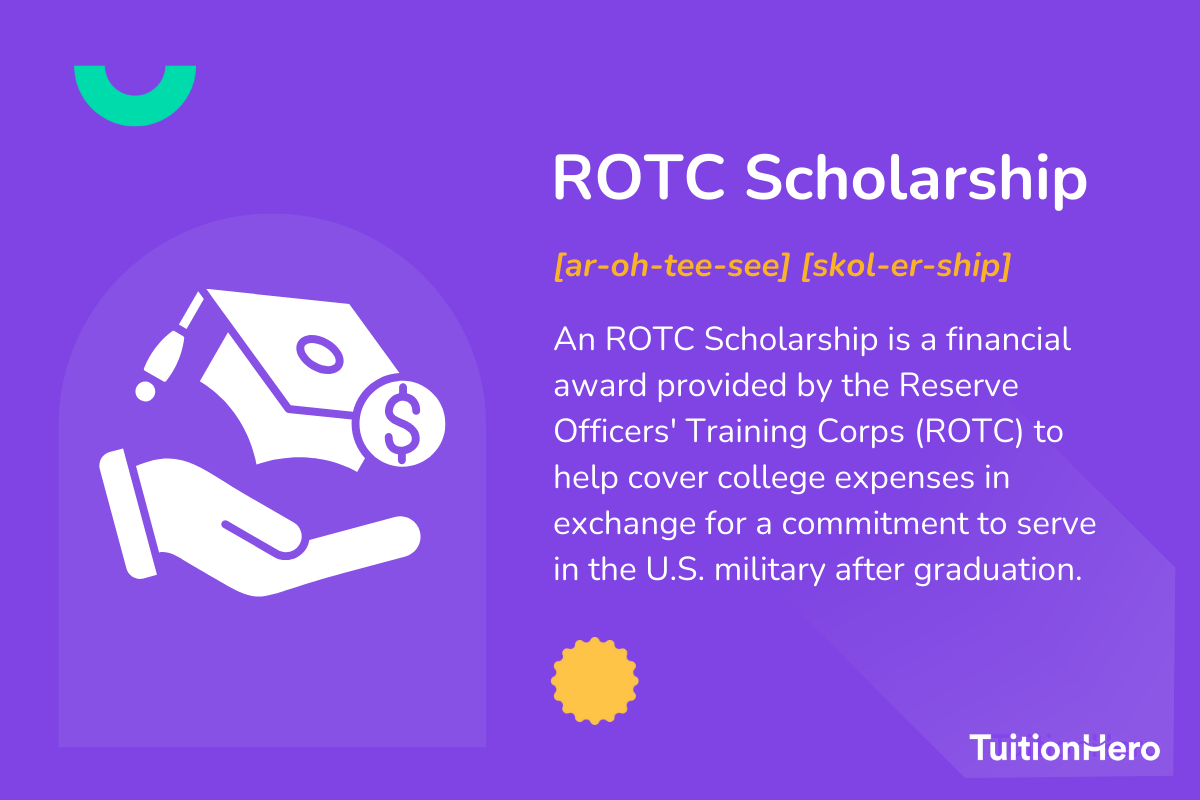Advertiser Disclosure
Last update: November 17, 2024
5 minutes read
How to Qualify for an ROTC Scholarship
Learn the steps to secure an ROTC scholarship, covering eligibility, how to apply, and benefits.

By Brian Flaherty, B.A. Economics
Edited by Rachel Lauren, B.A. in Business and Political Economy
Learn more about our editorial standards



By Brian Flaherty, B.A. Economics
Edited by Rachel Lauren, B.A. in Business and Political Economy
Learn more about our editorial standards
Interested in how to qualify for an ROTC scholarship? ROTC scholarships offer a solid path to college funding and a career after. You'll learn the essentials of qualifying for an ROTC scholarship, including academic requirements, physical fitness standards, and service commitments.

Key takeaways
- ROTC scholarships require a commitment to service, as well as academic and physical excellence
- Start investigating ROTC options in your junior year of high school for the best shot
- Scholarships cover tuition, fees, and provide monthly stipends
What is ROTC?
The Reserve Officers' Training Corps (ROTC) is a college program for students who pledge to serve in the U.S. military post-graduation. If you're considering a military career or a structured post-college trajectory, ROTC might be your ticket!

Who can apply for an ROTC scholarship?
ROTC scholarships aren't just handed out; they're earned. Here's who’s eligible:
- You need to be a U.S. citizen
- At least 17 years old, and under 31 (under 23 for Navy)
- Have a high school diploma
- Have a minimum 2.5 GPA (or 3.0 for Air Force)
- Meet SAT/ACT benchmarks
- Be physically fit per military standards
How do ROTC scholarships help with college costs?
Imagine zero tuition fees, a book allowance, and a month-to-month cash stipend. Sounds like a dream, right? That's what an ROTC scholarship brings to your college table.
It's here to cover college costs – and maybe even pave your way to a noble career. If you don’t qualify for an ROTC scholarship, you can still join the program if you want to serve your country as an officer.
These scholarships are highly competitive. In fact, many ROTC cadets are still paying full price for school. Remember, there are other military aid forms, such as the Coast Guard's College Student Pre-Commissioning Initiative (CSPI), for those leaning toward maritime service.
What are the ROTC scholarship requirements?
Once you manage to get an ROTC scholarship, expect to go all-in on both academics and the military. Here are some of the requirements:
- Enrolling in ROTC courses about your military branch's history and workings.
- Muscling through military training, like tactics, leadership, and fitness.
- Joining summer programs, specific to each military branch, designed to sharpen your skills.
Army ROTC cadets, for instance, will hit Basic Camp in Fort Knox. Aspiring Air Force officers face a 13-day field training in Alabama. Navy ROTC applicants head into multiple summer training escapades.
What’s the ROTC service commitment?
Signing up comes with a promise: post-college service. The Army requires 8 years of service, the first 4 of which might be active duty.
The Navy, meanwhile, requires 5 years of active duty (4 if you opt to join the Marines). The Air Force asks for up to 10 years if you plan to be a pilot, and 4 to 6 years for other roles. This isn’t just a scholarship - it’s a service pledge.
Compare private student loans now
TuitionHero simplifies your student loan decision, with multiple top loans side-by-side.
Compare Rates
The ROTC scholarship application steps
When applying for an ROTC scholarship, you should follow the steps below:
- Check out the branch-specific ROTC websites for the specific details.
- Talk with your local military recruitment office; they’ll be able to help you.
- For high schoolers, kickstart this by junior year or the start of senior year.
- College kids: look into 2 and 3-year scholarships that might still be within reach.
Getting a head start with the JROTC
The Junior Reserve Officers' Training Corps (JROTC) is a program in some high schools that helps students become better citizens by teaching leadership skills, responsibility, and community service. It's run by different branches of the U.S. military, like the Army or Navy.
Students in JROTC learn about military customs, drills, and discipline, but the main focus is on building character and leadership. Joining is optional, and it doesn't mean you have to join the military later.
The program includes classes, physical training, and community service projects. It's a way for students to learn important life skills, and is the ultimate prep platform for the tough ROTC routine.
Do’s and don’ts of applying for an ROTC scholarship
Getting an ROTC scholarship has its own set of rules. Let's tackle them with a helpful list of do’s and don'ts to make sure your application shines and your ROTC starts off right.
Do
Research all your ROTC options including Army, Navy, and Air Force variants.
Maintain good grades and fitness – both are important for eligibility.
Visit a local recruiter or ROTC website early in your schooling to get a jumpstart on requirements.
Apply even if your intended major isn't usually associated with the military – diversity is valued.
Don't
Wait until the last minute to look into programs or deadlines.
Let your grades slip or neglect your fitness if you're serious about qualifying.
Overlook the importance of early preparation.
Assume ROTC is only for people pursuing military-related majors.
Advantages and disadvantages of applying for an ROTC scholarship
Accepting an ROTC scholarship is a big decision that comes with plenty of benefits and some strings attached. Here’s your strategy guide to weighing the pros against the cons before taking the plunge.
- Complete tuition coverage, which usually includes book provisions and a monthly stipend.
- Early leadership and management training, giving you a head start in career development.
- A guaranteed job post-graduation – in uniform service, contributing to national security.
- Personal development, thanks to a demanding mix of academic and physical challenges.
- Networking opportunities with peers and military professionals that can last a lifetime.
- Mandatory service commitment after graduation can be lengthy, depending on your ROTC branch.
- Balancing the demands of ROTC and academic work might get hard.
- Less flexibility for college experiences due to structured ROTC demands.
- The risk of penalties, including repayment obligations, if the scholarship's terms aren't met.

Why trust TuitionHero
At TuitionHero, we're here to help make college financing easier for students and parents. College costs can be overwhelming, especially when thinking about options like the ROTC.
We offer support for Private Student Loans, Student Loan Refinancing, Scholarships (including military programs), FAFSA help, and Credit Card Offers to support your college journey.
Whether you're interested in ROTC scholarships or exploring other ways to fund your education, our expertise is tailored to your needs. We'll guide you through the financial aspects, so you're well-prepared for college funding. Let us help you gain control over your finances.
Frequently asked questions (FAQ)
The best time to start preparing is during your junior year of high school, though the actual application deadlines might vary by branch. Starting early gives you plenty of time to meet all the requirements, from academic achievements to physical fitness milestones.
Yes, ROTC scholarships can be combined with other forms of financial aid. Students with financial needs beyond what the ROTC covers can look for federal aid or other scholarship opportunities. At TuitionHero, we can help you efficiently stack different financial aid sources with your ROTC scholarship.
While ROTC scholarships are open to many majors, students in fields like engineering, computer science, certain foreign languages, or nursing may have an edge due to the high demand for these skills in the military. If you're thinking about which major to choose, we at TuitionHero can help you figure out how your academic goals align with scholarship opportunities.
Final thoughts
Starting the ROTC scholarship application is a sign of your commitment to your education and your country. It might be a bit challenging, but the goal—a great college experience and becoming an officer—is worth it.
TuitionHero is here to help you throughout the process, offering guidance on ROTC and college finances. Check out our ROTC Scholarship assistance page for more help as you head confidently toward college.
Source
Author

Brian Flaherty
Brian is a graduate of the University of Virginia where he earned a B.A. in Economics. After graduation, Brian spent four years working at a wealth management firm advising high-net-worth investors and institutions. During his time there, he passed the rigorous Series 65 exam and rose to a high-level strategy position.
Editor

Rachel Lauren
Rachel Lauren is the co-founder and COO of Debbie, a tech startup that offers an app to help people pay off their credit card debt for good through rewards and behavioral psychology. She was previously a venture capital investor at BDMI, as well as an equity research analyst at Credit Suisse.
At TuitionHero, we're not just passionate about our work - we take immense pride in it. Our dedicated team of writers diligently follows strict editorial standards, ensuring that every piece of content we publish is accurate, current, and highly valuable. We don't just strive for quality; we aim for excellence.
Related posts
While you're at it, here are some other college finance-related blog posts you might be interested in.
Shop and compare student financing options - 100% free!

Always free, always fast
TuitionHero is 100% free to use. Here, you can instantly view and compare multiple top lenders side-by-side.

Won’t affect credit score
Don’t worry – checking your rates with TuitionHero never impacts your credit score!

Safe and secure
We take your information's security seriously. We apply industry best practices to ensure your data is safe.
Finished scrolling? Start saving & find your private student loan rate today





